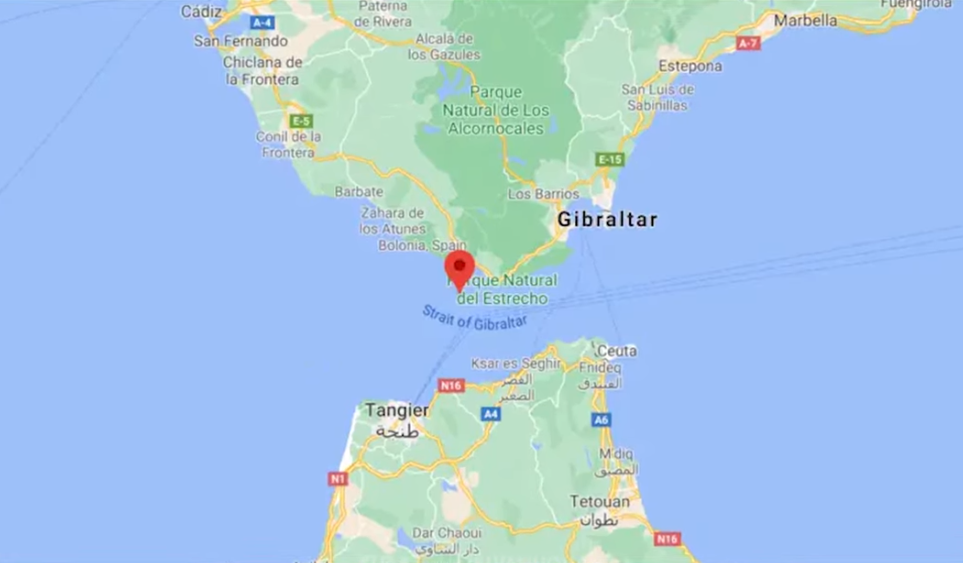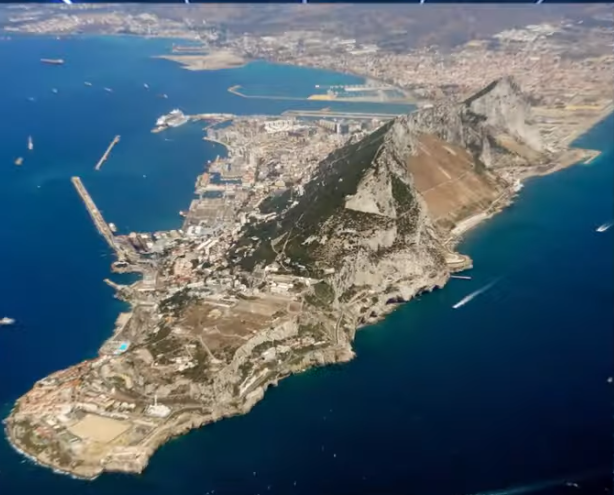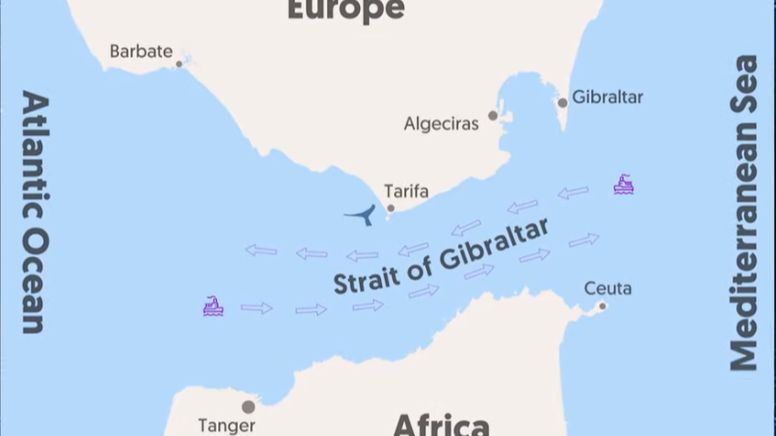People often say that Africa is just a puddle away from Europe. Indeed, at the southern tip of the Iberian Peninsula in Europe, it is only 14.3 km from Morocco in Africa. If you take the ferry, it only takes a little over 30 minutes, and that puddle of water is called the Strait of Gibraltar. The Strait of Gibraltar is named after a territory located next to Spain. Gibraltar does not border any other country besides Spain. It is an important transit area that plays a strategic role in international maritime and military affairs because it is the only place that connects the Atlantic Ocean and the Mediterranean Sea.
But why is this place a British overseas territory, and why did Spain have to accept losing this strategic position to another country? Greek mythology tells that once, the hero Hercules, on his way to accomplish his 12 labors, reached the far western end of the world, where a towering mountain blocked his path. Being of divine blood, Hercules had extraordinary strength, so he stomped down hard on the mountain, causing the earth and rocks to crumble and create a narrow waterway. From then on, the Mediterranean inhabitants could pass through the end of the world by boat, which is the Strait of Gibraltar today, because in ancient times, the Greeks did not have many means to explore.

They arrived at Gibraltar and thought it was the end of the world; the great mountain named Gibraltar is also called the Pillar of Hercules, due to the legend that when opening this strait, the demigod piled earth on both sides of the coast, one side forming the mountain of Gibraltar in Europe, and the other side being the mountain in Morocco in Africa. The history of this land is extremely complex, with the first evidence of ancient human existence appearing 50,000 years ago. Ancient heating stone tools and animal bones dating back about 40,000 years to about 5,000 years ago have been found in the remaining sediments in the Gocham Cave on the Gibraltar Peninsula. In ancient times, this place was part of the Roman Empire, and after the fall of Western Rome, Gibraltar was invaded by Muslims from North Africa.
During this time, Spain in particular and the Iberian Peninsula in general were almost entirely occupied and ruled by Islam. Until the 14th century, Gibraltar was under the control of the Castile dynasty, the predecessor of modern Spain. History changed at the very beginning of the 18th century when the War of Spanish Succession broke out; King Charles II of Spain, a physically and mentally weak man, died in 1700 without an heir. The issue of succession was unclear, and many European powers began to support their preferred candidates. War broke out, and in August 1704, British soldiers fighting alongside Dutch allies captured Gibraltar. This war continued until 1713 when the Utrecht Treaty determined that Philip V, the grandson of the French emperor, would inherit the Spanish throne as part of this agreement.
Some territories of Spain were ceded to other countries, and Britain gained Gibraltar as well as Mallorca. After changing hands several times, it ultimately returned to Spain, while Gibraltar remained with the United Kingdom. Thus, it has become a thorn in the side of the Madrid government for over 300 years. Since being forced to cede this strategic area to Britain, Spain, regardless of the regime, has always strived to regain Gibraltar, using all sorts of efforts from diplomacy to military, including a failed siege by Spain that lasted nearly four years until 1783.
Under the dictatorship of General Francisco Franco, Spain completely closed its borders with Gibraltar, and the border was only fully reopened just before Spain joined the European Union in 1985. Besides fishing boats, no other vehicles were allowed to enter. However, Spain continues to claim Gibraltar as its territory. Interestingly, the people of Gibraltar have never considered themselves a part of Spain. In response to the Madrid government's continuous closures, openings, and even near-blockades that made life difficult for this territory.
In the early 2000s, Britain and Spain were negotiating a potential agreement that would allow them to share sovereignty over Gibraltar. The Gibraltar government held a referendum on this plan, and 99% of the population voted against it. In 2008, the British government committed to respecting the wishes of the people of Gibraltar, and a new constitutional decree was passed in a referendum in 2006. A trilateral negotiation process began in 2006, between Spain, Gibraltar, and the United Kingdom, ending some restrictions and resolving disputes in specific areas such as air transport, customs procedures, telecommunications, pensions, and cultural exchanges. In the referendum in the UK regarding EU membership, 96% of the people of Gibraltar voted to remain in the EU, with a voter turnout of 84%.
Spain reiterated calls for joint control between Spain and Britain over the peninsula, which were strongly rejected by the Prime Minister of Gibraltar. On January 31, 2020, the United Kingdom left the European Union, also known as Brexit, and thus Gibraltar did as well. According to the terms of the transition period in the Brexit withdrawal agreement, Gibraltar's relationship with the EU remained unchanged until the end of 2020, when it was replaced by the EU-UK cooperation and trade agreement. On December 31, 2020, the UK and Spain agreed in principle on the basis for the EU and the UK to negotiate an agreement through which Gibraltar would join the Schengen area to avoid a hard border with Spain; the agreements have not yet come into effect. Gibraltar has negligible natural resources and limited freshwater sources, confined to natural wells in the north.
Until recently, Gibraltar has used large concrete or natural stone water tanks to collect rainwater, supplemented today by two desalination plants: a reverse osmosis plant built in a tunnel inside the rock, and a multi-stage quick-cut plant in Normon. The terrain of Gibraltar includes the 426 m high Rock of Gibraltar, formed from Jurassic limestone, and a narrow coastal lowland surrounding it, with many tunnels, most of which are still operated by the military and closed to the public. This mountain is the only treasure that Gibraltar can show to visitors, and inside the mountain is the Gocham Cave.

The Gocham Cave, while not as magnificent as the Phong Nha-Kẻ Bàng area, has beautifully shaped stalactites. Just down the stairs in the damp cave, there are rows of seats because one area of the cave is designated for concert performances. Visitors are warned to be careful of the wild monkeys from Algeria, the most mischievous in Europe; besides the ability to steal food, remove glasses, and take off hats, they can also sniff out plastic bottles left in bags, so one must be careful not to get snatched. In the 18th century, these mischievous monkeys alerted British soldiers to the intrusion of Spanish troops, leading to the legend that as long as there are monkeys, Britain will still control Gibraltar; when the monkeys are gone, Britain will also lose control of Gibraltar.
Around 1944, Gibraltar had only three or four monkeys left. British Prime Minister Winston was concerned about the declining number of monkeys to the point that he sent a message to the Colonial Secretary requesting action to address the situation. Thus, dozens of monkeys were brought here, and Swiss researchers confirmed that the British treat the monkeys as they would humans. Now the monkey population is about 300, alongside over 500 species of flowers and plants suitable for the Mediterranean climate.

In 2016, a report from the World Health Organization showed that Gibraltar had the worst air quality compared to any British territory, focusing on PM10 and PM2.5 pollutants in the air. This is because of the small area and high population density, compounded by the constant influx of tourists. Unlike other British territories, in Gibraltar, vehicles drive on the right side, and the most common means of transport are motorcycles, with a very good bus system. One of the most unique features in the world is the airport, not only because it is located two kilometers from the city center but also because it crosses the main road, Winston Churchill Avenue, cutting through a busy area, requiring roadblocks every time a plane lands or takes off, similar to a railway crossing, and its runway is less than two kilometers long, so it is only used for small aircraft, initially designated for the Royal Air Force.
Gibraltar's economy consists of four main sectors: financial services, online gambling, maritime, and tourism. The GDP per capita is about 50,000 USD per year, and Spain tightly controls everything through its border. They consider it an overseas territory because it belongs to Britain, so the people of Gibraltar face significant discrimination, which also happens to tourists visiting here. At the border, visitors must get out of their vehicles for all belongings to be inspected by Spanish customs. Buying anything from Gibraltar is seen as a threat to the Spanish economy, and Gibraltar has its own football federation and national team that regularly participates in Euro and World Cup qualifiers in Europe. Of course, with weak sports potential and a small country, they have never reached the finals of major tournaments. Gibraltar is indeed a fascinating territory, unique in the world.
